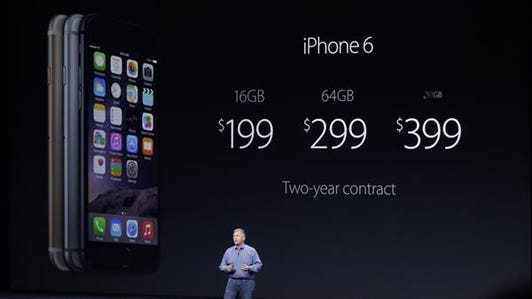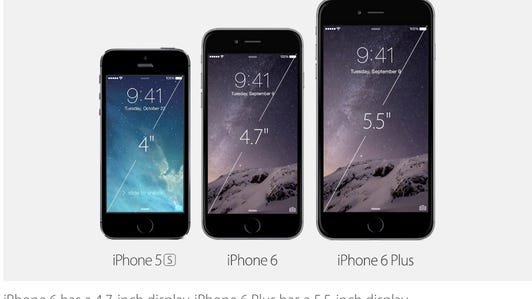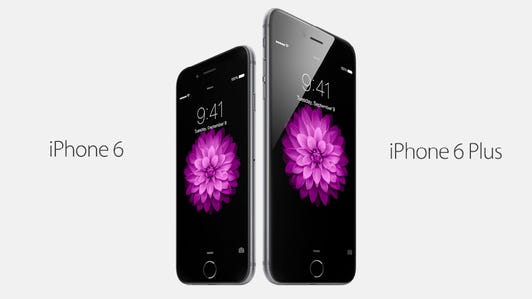
James Martin/CNET
It’s not surprising for Apple executives to jump up at the same time during meetings. That’s because they’re all wearing the Apple Watch that’s nudging them for sitting too long, says Apple CEO Tim Cook.
Cook, speaking Tuesday during the Goldman Sachs technology conference, said one feature of the Apple Watch — which hits the market in April — is a reminder to move around if you haven’t done so in the past hour. The watch will “tap” you on the wrist 10 minutes before the top of the hour, he said, and because so many people at Apple are wearing the watch, a lot of people end up standing during meetings.
“It took a while to get used to, but it’s actually really good,” Cook said. “A lot of doctors believe sitting is the new cancer.”
The remarks Tuesday in San Francisco come as Apple became the first company to ever close with a market value above $700 billion. Apple shares closed up 1.9 percent at $122.02. Cook said Apple in April will provide an update on its plans for returning cash to shareholders.
Apple’s stock has been on a strong run in recent months, helped in part by the news last month that the company reported the best sales quarter in its 38-year history, as demand for its newest smartphones, the 4.7-inch iPhone 6 and the 5.5-inch iPhone 6 Plus, soared beyond analysts’ expectations. The company said it sold a record 74.5 million iPhones during the period, much higher than the 66.5 million that analysts had expected.
The fitness apps tucked inside the Apple Watch (pictures)






+7 more
At the same time, Cook revealed the Apple Watch would start shipping in April. The company, which announced the device in September, earlier only said the Apple Watch would hit stores in “early 2015.” The lowest-end Apple Watch will cost $349.
The Apple Watch is the first major new product category for the company since what it billed as the “magical” iPad in 2010. It’s also the first new push by the company under Cook’s leadership. Cook had promised for over a year that Apple in 2014 would introduce
and enter beyond its wildly successful smartphones, tablets and computers. The Apple Watch, along with the new Apple Pay mobile-payments service, fulfill that vow.
See also
- Apple will invest $850M in California solar farm
- Apple notches huge sales in China during Q1
- CNET’s thoughts on Apple Watch
Along with health features, Apple Watch users also will be able to communicate with Siri, Apple’s digital voice assistant. And they’ll be able to use the device to purchase items with Apple Pay. App developers are working on hundreds of other uses for the wearable, which Cook on Tuesday said will make you think, “wow, I can’t live without this anymore.”
He also criticized the smartwatches on the market for failing to do what consumers really want. “There are several things called smartwatches that are shipping, but I’m not sure you could name any,” Cook said.
But he believes Apple Watch will do what the iPhone and iPad did earlier — “change the way people live their lives.”
“One of the biggest surprises people will have when using it is the breadth of what it will do,” Cook said.
Apple Pay’s fast expansion
Cook noted that Apple Pay, the company’s mobile-payments service, has grown “much faster” than he expected. More than 2,000 banks and credit unions, about 90 percent of the US market, accept Apple Pay, he said. Cook noted that Apple Pay is only possible because Apple controls the hardware, software and the service.
He reiterated Apple’s commitment to maintaining user privacy. Neither merchants nor Apple store your credit card number, and Apple doesn’t track what you’ve purchased. It makes money from selling hardware and from services like iTunes, not from selling user data.
“We believe that customers have a right to privacy,” Cook said. “The vast majority of customers don’t want everyone knowing everything about them…You are not our product.”
‘Make the best, not the most’
Arguments that Apple needed to find a different way to sell in China, such as by creating cheap iPhones, were “a bunch of bull,” Cook said. Instead, the company found that people everywhere want high-end, great products. Not everyone can afford them, but so far, Apple has found a strong market for its pricey devices.
“We’ve always believed our role in life is to make the best, not the most,” Cook said. “And sometimes those…do intersect where you can make the best and the most…Last quarter they probably intersected or came really close.”
Apple announces iPhone 6, iPhone 6 Plus, and Apple Watch (photos)






+27 more
Apple generated $16.1 billion in revenue in Greater China in the fiscal first quarter, up 70 percent from the same period a year ago. In mainland China alone, sales more than doubled from the previous year. Greater China — which includes mainland China, Hong Kong and Taiwan — represented 22 percent of Apple’s total sales during the quarter ended December 27, and it was Apple’s second-biggest iPhone market after the US.
Emerging markets represent a critical source of growth for everyone from giants such as Apple and Samsung to newcomers like Xiaomi. China became the world’s largest smartphone market in 2011 and now is home to almost 520 million smartphone users. Apple has been working to gain market share in the country by reaching deals with major carriers in the region. An agreement with the world’s largest carrier, China Mobile, proved challenging but was key as it provides access to more than 800 million subscribers.
Cook noted that India could become a big, important market for Apple in the future. So far, it’s a small portion of Apple’s sales, but sales are growing rapidly and the company is making investments in the region.
“In a number of years you can envision India being really significant,” Cook said.



